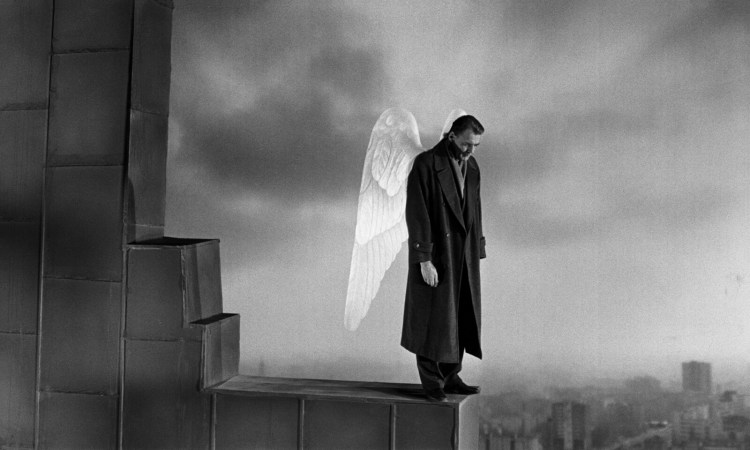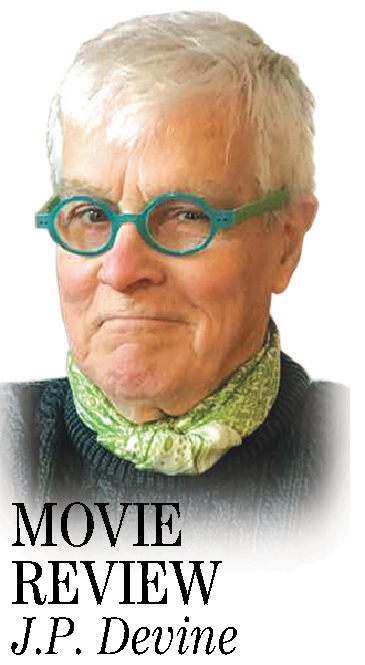Prepare yourself for one of the greatest foreign films in movie history.
In this great magical film, shown here in 4K digital restoration and made in 1987 by German filmmaker Wim Wenders (“Paris, Texas”), who joined together with the German playwright Peter Handke, there is so much to follow, so many ideas to ponder.
The opening shot is of our star (Bruno Ganz) in an overcoat, wings folded, standing atop a tower, looking down on the shattered city of Berlin.
This is not his first such view. He, who looks like any man in the street, has seen the destruction of Gomorrah, Rome, Gettysburg and Tokyo.
Our players are two angels, Damiel (Ganz) and Cassiel (Otto Sander). After Damiel’s tower scene, they have no wings. This is not Disney.
Since the moment humans began to worship a deity, they have believed in angels. In overcoats, wings and tiny ponytails? To Wenders and Handke, it doesn’t matter.
They and the other angels they encounter have been here for billions of nights without sleep, days without hunger or thirst, or the senses of love, sorrow or joy.
These heavenly voyeurs look just like us. They wander about the Earth like celestial tourists, wearing drab winter overcoats and scarves, hands in pockets, like men on a vacation.
Wenders shows them sitting unseen, beside a young suicidal man on a train, and by touching him, lifting his spirits if only for that moment.
In another scene, Damiel appears at the scene of an auto accident and comforts the dying man, holding him in his arms until from down the street, a young man (the victim’s son?) arrives to take over.
Somewhere else, blocks away, Cassiel walks through a field beside an elderly poet, a Holocaust survivor who speaks in poetry as he wanders the war-torn ruins he once loved, lamenting the end of everything. Cassiel touches his shoulder. The old man seems to know he’s there.
We sense that this is their job — or maybe their punishment? — simply to spend eternity observing.
Believers of all faiths will be saddened to know that Wenders’ angels create no miracles, save no lives, stop no bullets. They are God’s scouts. They heal no wounds. They’re only here to stop the bleeding in the soul.
But this isn’t a religious documentary about angels. There is a plot here, a beautiful and sad one with a twist that goes back to Eve’s choice in the garden. To watch it all unfold is a great experience.
While idling in the empty seats of a circus on its final days, Damiel sees a high-wire performer (Solveig Dommartin) high in the lofts wearing a pair of fake angel wings in her act.
This is the moment and character Wenders tells us to hold on to, because, this sad, lost fake angel will change everything for Damiel.
Things now begin to come together. With Berlin’s chaos front and center, just as the Cold War is ending, Wenders drops in Peter Falk, as an opportunistic American television actor who has come to play in a movie about the Nazi era.
Peter, who plays himself, is clearly the star of the studio film, and walks about giving orders and making sketches of the other players, trying on hats and coats. When he passes Damiel and Cassiel, he seems to sense them and mutters, “I can’t see you, but I know you’re there.”
He too, when we discover who he really is, will change everything in a dramatic turn of events, when we hear Damiel speak these words to his friend: “I want to invent a story for myself, learn to bear a harsh sight, to taste, a brusque shout, a sour smell. I’ve been on the outside long enough. … I want to just hold an apple in my hand … eat in a fine restaurant. … I will be known to everyone and they to me.”
It’s now we learn that even for angels, the snake in Eve’s garden has an apple.
There will be a fall, but how far, for how long?
The great Ganz will be missed, as will Sander and Dommartin, who played Marion. Solveig died in 2013. All three are possibly angels themselves now.
The casting of all — especially the sublime Bruno Ganz, who went from this angel in “Wings” to the absurd horror of playing Hitler in “Downfall” — was a brilliant move.
Henri Alekan, who was the cinematographer of Jean Cocteau’s “Beauty and the Beast,” makes wonderful choices here. Earthlings see in brilliant color; the angels, in gorgeous shadows of black and soft caresses of white.
“Wing of Desire” is much more than a movie; it’s a powerful, tasty experience.
Pay attention, watch carefully. “Wings” doesn’t appear often, and you may not get a chance to watch it again on a big screen.
Slipping it into this year’s MIFF schedule was clearly not only a wise move, but a gift of love from the programmer to all of us. Don’t miss it.
J.P. Devine, of Waterville, is a former stage and screen actor.
Send questions/comments to the editors.




Comments are no longer available on this story